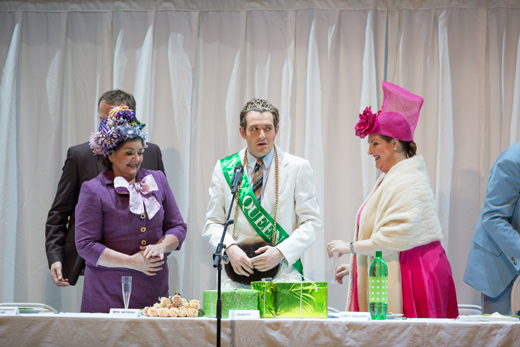 Spain B. Britten, Albert Herring: Soloists, Capitole Orchestra, David Syrus (conductor), Théâtre du Capitole, Toulouse, 27.1.2012 (JMI)
Spain B. Britten, Albert Herring: Soloists, Capitole Orchestra, David Syrus (conductor), Théâtre du Capitole, Toulouse, 27.1.2012 (JMI)
Co-production Opera Comique and Opera Rouen
Direction: Richard Brunel
Sets: Marc Lainé
Costumes: Claire Risterucci
Lighting: Mathias Roche
Cast
Albert Herring: Sam Furness
Lady Billows: Tamara Wilson
Florence Pike: Susan Bickley
Miss Wordsworth: Ana James
Mr. Gedge: Dawid Kimberg
Mr.Upfold: John Graham-Hall
Mr. Budd: Wayne Tigges
Sid: Craig Verm
Nancy: Daniela Mack
Mrs. Herring: Anne-Marie Owens
Emmie: Fiona Brindle
Cis: Emma Warner
Harry: Finlay A’Court
The year 2013 not only marks the bicentenary of Verdi and Wagner, but also the centenary of Benjamin Britten. Toulouse has taken note and offers works by all three great composers. The opera season opened with Rienzi and it will close with Don Carlo, while the first opera in 2013 is Albert Herring, Britten’s third or fourth, depending on whether we count the operetta Paul Bunyan.
Benjamin Britten is not only the greatest opera composer in the history of Britain, but increasingly beyond. When Britten died in 1976, his operas were barely known outside the UK. In the last 30 years they have become—along with Leos Janáček’s—part of the modern repertoire, recognized for their greatness by musicians and audiences alike.
Albert Herring premiered at Glyndebourne in 1947, without much success. The opera has all the Benjamin Britten hallmarks, attracted to isolated characters and outcasts. This happens in Peter Grimes, Billy Budd and Death in Venice, and so it does with Albert Herring. The titular anti-hero is mocked by the people of Loxford for his timidity, which wins him the “May Queen” award for being the last virgin standing. Unhappy with his lot, and drunk, he decides to flee. Presumed dead, to the consternation of his family and neighbors, he shows up after all and stakes out his independence from the strictures his mother had placed on him.
  B.Britten, Albert Herring, Steuart Bedford / Northern Sinfonia C.Gillet, J.Barstow, F.Palmer, D.Jones et al. Naxos     |
One of Britten’s chamber operas, it seems to me that it should be much more frequent performed. It has all the ingredients to succeed: an excellent score, a fun story, it’s cheap with an orchestra of 13 players and no chorus, and easy to cast with a group of singers that does not require big names or outlandish skill. You might say it’s a financial crisis-proof opera.
The Capitole de Toulousehas put on Richard Brunel’s production which had premiered at the Opera Comique in Paris in early 2009, a simple and well done production. The sets consists of a revolving stage with a kind of screen in the center, which facilitates scene changes. The action is nudged up a few years to a contemporary setting, with fun costumes and good lighting. The stage direction is focused on the group of singing-actors, and serves the score perfectly. The very effective use of projections should be mentioned, especially during the party of coronation of the Queen of May. Seeing the close-up of Albert Herring’s face during the speeches from his neighbors is a true spectacle.
Conductor was Britten-specialist David Syrus. The Head of Music at the Royal Opera, who has been rehearsing Britten Operas since the 1970s when he was a Royal Opera répétiteur, seemed effective, though I missed nuances and a touch of irony in his reading. The dozen-plus strong ensemble of Orchestre National du Capitole performed well.
Tenor Sam Furness was a remarkable interpreter of Albert Herring. This character needs a convincing singing-actor and Sam Furness delivers on those counts. The most interesting singer in the cast was American soprano Tamara as Lady Billows. She is a very promising young soprano whose voice fits the spinto soprano category. In less than a month she can be seen and heard in Les vêpres siciliennes in Bilbao, which will allow a more definitive judgment, especially if she can repeat such a fine performance.
Susan Bickley was none too powerful but good as Florence Pike, Ana James an excellent Miss Wordsworth, the village schoolteacher. Good impressions were left by baritone Craig Verm (Sid) and Mezzo soprano Daniela Mack’s outstanding Nancy.
José Mª Irurzun
